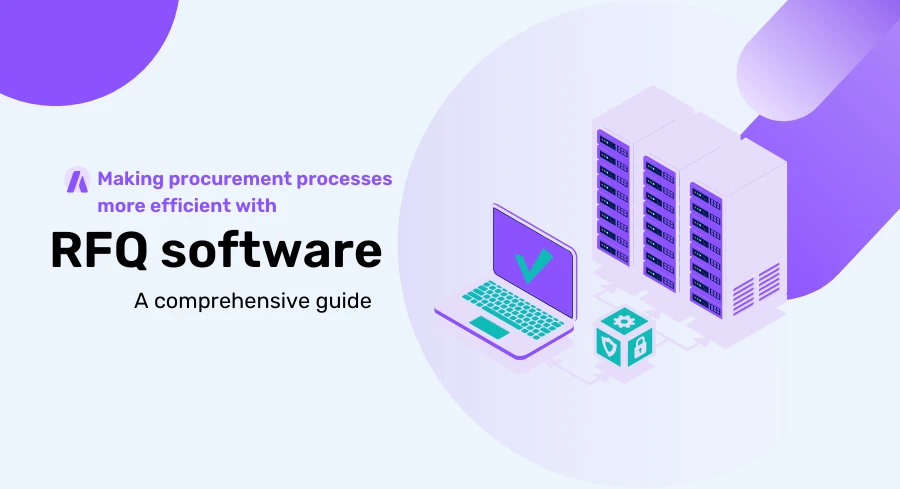Making Procurement Processes more Efficient with RFQ Software: A Comprehensive Guide
By TOI Desk Report
June 2, 2024
Update on : August 3, 2024

Efficiency and accuracy are considered to be the priority of each procurement department in modern business operations. The development of technology has led to the emergence of innovative ways that can assist in streamlining procurement processes and RFQ software is the latest breakthrough. This article will analyse why RFQ software is so important for purchasing management and how it helps in improving organizational workflows.
Understanding RFQ software: Revolutionizing procurement
RFQ software applications have gained popularity due to their ability to manage the consistent development and analysis of different RFQs within an organization. It, therefore, offers ease in getting quotes from various suppliers because the RFQ process becomes automated with this kind of software. Furthermore, one can find all stakeholders informed during the entire purchase cycle thereby providing transparency in communication.
RFQ software integrates with other procurement tools, hence offering a holistic sourcing capability. It assists firms in standardizing their RFQ processes, keeping excellent records and optimising supplier relations. It improves cost-reduction initiatives, shortens procurement cycle times, and raises overall procurement efficiency. However, RFQ software remains very critical in making improvements to procurement processes by enhancing transparency, effectiveness and co-working among stakeholders, thus leading towards organizational strategic objectives.
Key features and benefits of RFQ software
RFQ software comes with many features that are designed to improve the experience of purchasing. These include templates that can be customized for the creation of RFQs, supplier management systems, tools for comparing bids, and integration possibilities with other purchasing systems. These characteristics simplify acquisition processes, which ensure higher levels of effectiveness while reducing cases of failure.
Additionally, this kind of software can enable individuals to track their purchase requests in real time so that they are aware of where they stand about the entire procurement process. This kind of openness also provides information on how sourcing activities have been progressing and assists companies when making decisions about them or planning resources. Cost savings through optimized supplier selection and negotiation; standardized processes for risk mitigation; and streamlined workflows with improved operational efficiencies are some key benefits organizations get by centralizing their procurement activities.
Enhancing supplier relationships using RFQ software
Having successful supplier relationship management is the key to being a successful procurement function. An important element in nurturing these relationships is made possible through RFQ software which facilitates open communication and cooperative partnerships between the buyers and suppliers. This software provides a mechanism for simplifying the request for quotations (RFQ ) processes, enabling the transmission of requirement specifications, feedback, and responses to them. Long-term customer-supplier relationships based on trust and value are nurtured by this kind of tool.
The performance measurement tools also provide insights into supplier performance metrics such as delivery reliability, quality of goods, and responsiveness to issues that can be addressed via evaluation or vendor scorecards. This helps organizations make sound choices regarding who should supply them hence aligning vendors with their strategic needs and operational requirements. Generally speaking, transparency, collaboration and performance evaluation promoted by RFQ software enhance supplier relationship management, thus adding to the overall effectiveness & success of procurement operations.
Driving efficiency & cost savings
During procurement, cost containment is one thing that every professional would want to achieve, something that RFQ software assists in doing. Organizations can minimize manual errors, reduce cycle times and negotiate favourable terms with suppliers by standardizing and automating the RFQ process. It is software that makes sure every step of the procurement process, right from request creation to selecting the supplier is efficient and accurate.
Additionally, RFQ software also gives insights into pricing trends over time. This enables them to make data-driven decisions based on information that optimizes procurement spending leading to maximum value for money. By making use of these insights, procurement teams can spot savings opportunities, consolidate purchases, and build up better contracts hence increasing overall profitability as well as efficiency in an organisation. The conclusion is that not only does RFQ software improve procurement productivity but it also contributes towards cost control efforts through strategic sourcing, informed decision making and effective supplier management; thus, a must-have tool for achieving financial goals in current purchasing operations.
Compliance and risk management considerations
Procurement activities in today’s business context are governed by strict regulatory regimes, thus compliance and risk management are inevitable components within this sphere. One such instrument is RFQ software which ensures adherence to internal policies, industry regulations as well and contractual obligations. The software uses inbuilt approval workflows and audit trails to ensure transparency and accountability for procurement activities. The functionalities of the program allow procurement teams to trace and record every phase in the sourcing process to ensure that any decision made is within the confines of regulations and company policies.
Besides, RFQ software makes risk identification possible as well as mitigation strategies. Through supplier data analysis, market trends, and historical performance track records among others, this department can anticipate probable disruptions that could impact organizational interests positively. By doing so, firms can maintain operational continuity and resilience even when unexpected difficulties come up along the supply chain. All in all, RFQ software ensures efficiency gains, minimizes risks and promotes compliance thereby becoming a crucial element for contemporary procurement operations.
Future trends and outlook
The future of RFQ software looks even more promising with increasing technological advancements which foster great innovation as well as functionality. Consequently, RFQ software will possess capabilities that include predictive sourcing, demand forecasting, and supplier performance optimization through artificial intelligence (AI), machine learning (ML), and predictive analytics, respectively. These technologies will allow businesses to predict trends in the market, optimize inventory levels, and enhance decision-making.
Furthermore, blockchain’s integration into the procurement software could disrupt transparency and traceability within supply chains. Using secure transactions that are unchangeable, blockchain can guarantee ethical sourcing practices. Increasing visibility and accountability across the supply chain network improves supply chain risks. In this way, they will make it possible for an enterprise to streamline procurement processes, save costs and create a more adaptable global marketplace.
In conclusion, RFQ software is a significant technology for modern procurement management as it provides the tools required to streamline processes, improve relations with suppliers, save costs and mitigate risks. This means that organizations can use RFQ platforms to build operational excellence and stay ahead of the competition in today’s fast-paced business world.















